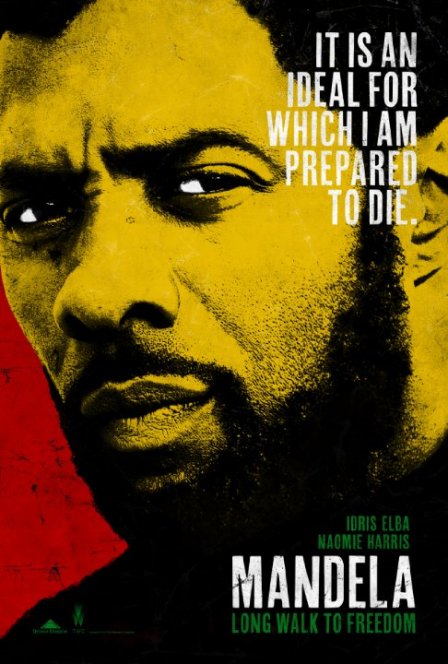Back in my public radio days, one of the few guys doing a similarly challenging program decided one day to put together an entire show to pay tribute to Frank Zappa, his reasoning being that the guy was going to die someday, so he wanted to have it on record that he was a fan and that he “Got it, man.” He even made a pointed effort to, for the first time, include a playlist in the studio logbook. This came to mind as I sat through the well-intentioned but half-hearted Mandela: Long Walk To Freedom. I couldn’t shake this feeling that screenwriter William Nicholson and director Justin Chadwick really wanted to hurry this movie out before the imminent death of Nelson Mandela. They almost made it, too.
Don’t let that diminish the good intentions of this picture, though. The filmmakers do succeed in providing a fine bullet pointed list of the key moments in Mandela’s life. We get his early days as a lawyer, his move into working with the African National Congress, to his anti-apartheid protests that led to violent action and his arrest. Along the way we see the dissolutions of his two marriages, as well as his power growing stronger while incarcerated, leading to his 1990 release and his ascendency to president of South Africa.
No doubt, it’s an amazing story, but there’s just no there there. The film never gives any indication of Mandela as a human being outside of the moral failings that destroyed his first marriage and the struggle to deal with losing Winnie late in the movie. Every other scene Idris Elba — who plays Mandela — has in the film, no matter who it’s with, features Mandela spouting platitudes when he’s not raising his fist to the air and yelling, “AMANDLA!”
Worse still is the woefully underwritten portrait of Winnie Mandela, not helped in any way by a one-note performance by Naomie Harris. Elba fares only slightly better, particularly in the long stretch of the film during which Mandela is imprisoned on Robben Island, straining to maintain his humanity under harsh conditions and worse treatment, and in the closing scenes as he negotiates for his release. Everywhere else the film is treated like a rough outline sketch of the man and his legacy.
If there’s a positive to be taken away from Mandela’s passing, it’s that it is hopefully leading people who were unaware of his life and work to seek out more information. Long Road To Freedom, based on Mandela’s memoir of the same name, is as good a place to start as any. I would have to hope that there are some that dig deeper and start coloring and shading in this outline. But if they stop here, a CliffsNotes version is better than nothing at all.

